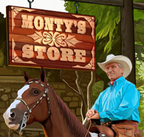My friend has an OTTB who has bad eating habits due to being starved after coming off the track. he is described to be very dominant over most handlers and especially at feed time. As my friend describes, he bites, kicks, gets fizzy and dominant, etc. and also apparently he charges most people but not her and her dad. How can she phase those bad habits out of him?
Rewards
Subscribe to Equus Online University and become a part of Monty's worldwide mission to leave the world a better place for horses and for people too.
Students automatically gain access to special rewards, such as exclusive discounts at the Monty Roberts Online Shop. Visit Monty Roberts Online Shop.




Hi Help,
Especially after such a bad experience, but in general one should leave horses alone, when they eat. So I suggest your friend takes him out of his stall, tye him up somewhere where he cannot see what is going on inside his stall, put his feed in there and then let him return to his stall. This way he doesnot associate the feed with the person, but "finds" it on his return.
Give him time to gain trust, starvation is a deep trauma. He seems to trust your friend and her dad, so that's a very good start. He's lucky to have found such loving new owners. She can deepen his trust by Join-Up and other trustbuilding work, like groundwork or just sit with him and have no agenda.
Remember that his survival was at stake, when he had this bad experience, he still thinks he needs to defend his life!
Good luck,
Miriam
thankyou Miriam ill show her what you said and see if it helps :) thanks
Yes, as Miriam says. He needs time to adjust & get to know they will never let him go hungry, so regular meal times is a must with plenty of good quality fibre / hay.
Definitely feed as Miriam describes & do leave him alone to eat, he needs peaceful surroundings to feel safe when he eats.
I currently have a friend's ex race horse in my paddock. He too was a bit bossy with his feed when he arrived and didn't like me walking into his paddock with the bucket to put it in his bowl. He also got stroppy when I was putting his rug on. He is lame in one front leg as he had a large nail go right through his hoof up into the peddle bone so I am unable to do join up which I know would really help our relationship. The vets and farriers feel that he will only be a paddock horse now but he seems to be getting much better now he is moving around on it more So maybe join up will be possible soon.. He has been stabled for the last 12 months and poked and prodded with needles so he is quite sour. With my friends permission I have been doing some dually training with him and that has really helped. Familiarised him with the dually first and then made him walk in the sweet spot while I carried the bucket of feed and the made him stand back a metre or so and wait for me to put it in his bowl. Did this a few times and now I can enter his paddock with the bucket give him a good rub on the forehead and walk to his bowl with the food with him in the sweet spot on the opposite side of the food. I do hold my arm out in front of his head as we walk to keep him in the sweet spot. When we reach his bowl I put my hand up and make him stop about 2 metres away as I put his feed in as I did previously with the dually. If he moves at all towards me I immediately move him back again, if he looks at all stroppy then I chase him away until he comes back politely. Seems to be working for me but it is not a stable situation but I would try training yours with the dually in the stable too.
I have a welsh cob, that I bought from a friend 7 years ago. She had him from 2 months old, he was taken away from his mother early because she was very aggressive with him, especially at feed times (they had to separate her and the foal) He has been well looked after from day 1 and has never known any form of abuse or ever known what it is like to go hungry, He is however terrible when it comes to feeding, not with people but with other horses. He will attack any horse that comes near the stables when we trying to put them in, we always have to put him away first and then lead the other horses to their stables. He is like a snapper turtle and tries to bite the other horses when you lead them past his stable. I normally feed my horses in and then open the stables, so they have a choice as to whether they want to be in or out. A little while ago he trapped one of my other horses in his stable and ended up kicking him in the head, my other horse died from the result of this injury. I now no longer let them out after a feed incase this happens again. How can I stop his aggressive behaviour when it comes to food? Other than the food story, he is a well behaved, placid pony. Any suggestions?
Tracy, I am so sorry your other horse dies from the injury. That is just a terrible way to loose any animal.
.
This is bit beyond my area of knowledge, but since he was taken away so early from his mother and handled a lot by humans (I gather anyway)could it be that he simply lacks understanding of the language between horses and therefor miscommunicates (is that a proper word???)with them?
.
I'm thinking he ends up confused about what they are "saying" and so turns to aggression to protect himself (his space and his food) when flight isn't an option.
.
How does he behave out in the field with the other horses?
Hi Kicki
Thanks for your reply. He is fine in the field with the other horses. He is really a sweet pony and does not show any signs of aggression other than when food is involved. I have also thought that maybe he does not know how to speak "horse" I did get a new mare, who seemed to be teaching him some horse manners and would not let him join up with her for over a month. However when it comes to food, he is still the "Boss" and even she moves away from him. I am not sure if there is a way of correcting this behaviour?
Hi Tracy,
Is there any chance you can get a video recorded and upload to the FB uni page so we can see what he's saying. Would need to see him at pasture with the other horses, when you take food to the pasture, you taking hum into the stable first and if you feel safe to do so also last. From what you describe it sounds like learned behaviour if that's what his mother taught him then he will follow what he's learnt. It will be possible to change, but we'd need to see him first and the routine in action so we can see what he's thinking.
Mel x
Lenny, mirriam has detailed what yoy need to know, always make sure he has access to forage, don't limit it, but also ensure he has more than adequate exercise to maintain weight.
Mel x
Hi Tracy
:
May I offer a bit of lateral thinking for you to consider :-) By all means ignore if it doesn't help but sometimes looking at things from an outside perspective can be helpful as when we are 'in it' we are sometimes too close to the problem. Apologies in advance for the questioning format - it's just to help put my thinking in order
:
1. Do ALL or ANY of your horses really need feeding or is it something that you like to do/think they need? Cobs are usually 'good doers' as they say in the UK, why does he need extra feed? What is the ratio of horses to grazing that you have?
2. Do you want to (a) manage this situation or (b) train it out of him. Option (a) is relatively easy but does not solve the behaviour but makes it safe for all concerned. Option (b) changes the behaviour and can be made permanent but takes a lot of time and effort. There is no judgement on my part here, both options are viable, it's about being honest with ourselves about how much time we can commit
3. What is your thinking behind bringing him in first? What happens if you bring him in last (if you have tried this)
4. If you bring him in first - assuming it's traditional stable doors, is it possible to shut his top door as well until all the others are in?
:
If you consider it from his point of view, he will repeat the behaviour because he deems it to be effective. i.e. "A horse walks past my stable; he might steal my food; I snap at him; ah, he's gone past, hasn't stolen my food, it works!!" So of course, he will repeat it. He does not know that they were not going to steal his food, he just knows that what he does is effective so it is VITAL to change the whole picture.
:
There is a lot more to this explanation Tracy but I will wait for your reply so I don't go off on a tangent away from what is helpful to you (or not as the case may be!)
:
Best wishes, Vicci
Hi All
Vicci, your questions are awesome; your approach to help us in our problem, solving efforts is even better. THANK YOU for your presentation that brings the " light of day" to our problems with horses.
.
.When reading through this thread, i was struck with the notion that most of these problems occur from horses that are stalled along with having a troubled start in life. [race horses are held in less than loving circumstances unless they WIN].
.
Our horses have always had the opportunity to run free, as a herd, with the exception of the stallions, so there has been a natural BALANCE to their environment. I HAVE ALWAYS FELT BLESSED because of that freedom that we can give them. However, with that said, I realize that most of the equestrian world, stalls their horses, so those horses have to adapt to their environment. I believe they can do this very well with loving intervention from their leaders as long as the horses can get out and see the light of day. I would look at getting out of the stall as a re-invigoration of the SOUL for the horse. If a horse cannot find HIS SOUL he probably will go to a place to just PASS THE TIME AWAY or exercise his FIGHT INSTINCTS to cope with the extreme NOTHINGNESS that he feels so keenly; an over-the-top lack of balance in his life.
.
.I believe that these horses can be helped with the right loving leadership, if they don`t suffer for too long.. This is by no means a quick fix, but can be accomplished if WE stay the course.
.
.Some you have stated that these troubled horses belong to friends and you all are leading the way to help the situation.
.. YOU ARE REGARDED AS ANGELS in the eyes of the horse. PLEASE, PLEASE KEEP UP THE GOOD WORK.
.
.My best to you all
Bud
How's things Tracy, any luck with your biting horse?
What is a OTTB ?
Tracy:- I too have a welsh cob sec D. Again, he too is a sweet boy and not aggressive with other horses or people however, he is like a Labrador dog when he gets a treat or his feed.
He loses totally focus when food is in site, so I don't train with treats.
His demeanor changes with food and this I have read from other cob owners too, so, I don't know if there is such a thing as a character trait for this breed of horse (?)
Vikki:- my cob gets 400g of food spread over two feeds, I do this because even though he has access to hay 24/7 the grass and hay does not contain the minerals and vitamins he needs, he also has access to salt stones and mineral powder 24/7 which all of my horses dosier themselves.
The difference in his overall health and coat and hoofs since I have owned him is dramatic, and he is not overweight .
Hi Dionne and all,
OTTB= Off Track Thorough Bred, so a racehorse that needs retraining after a career at the racetrack. Think of this kind of horse as being restricted during initial training in gait and in competitive behavior, they might have the tendency to "lay on the bit" so take the bit between their teeth and go into pressure. A lot to retrain, but worthwile!
Miriam